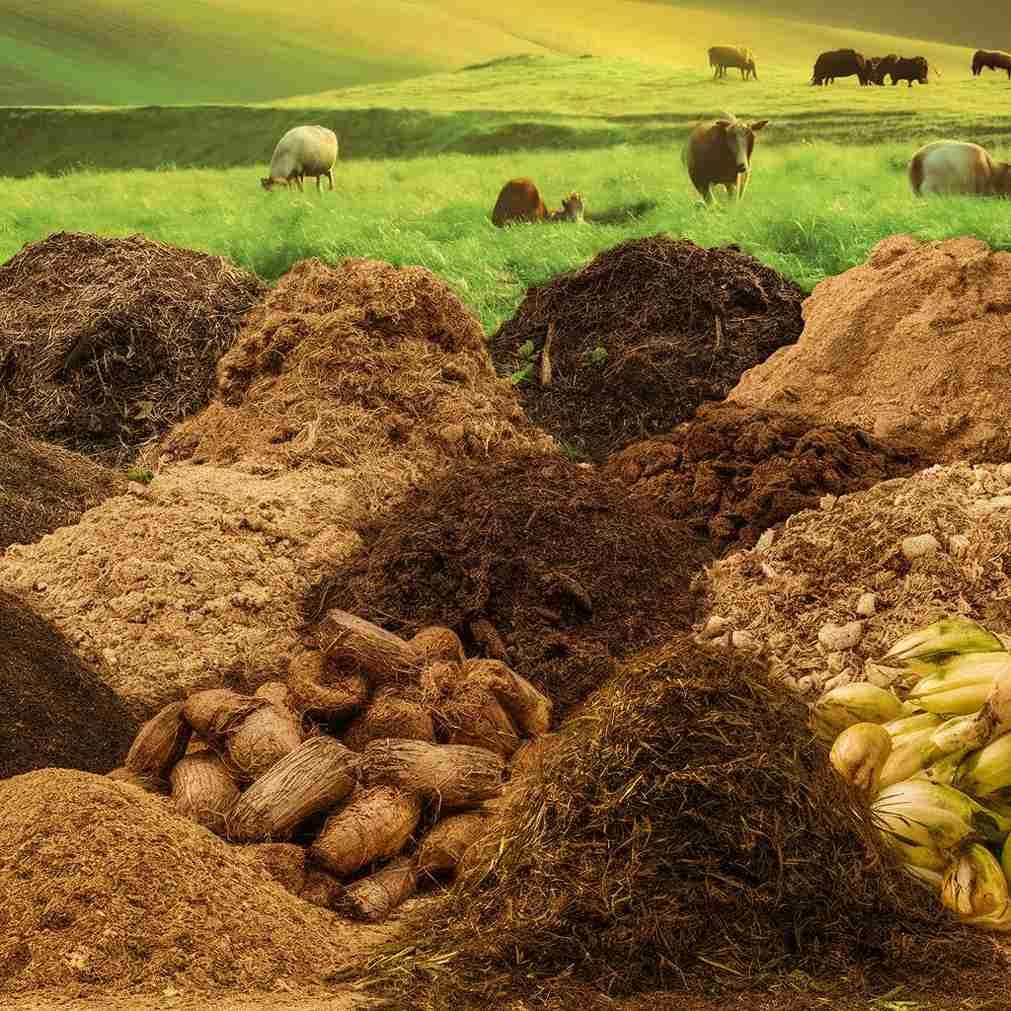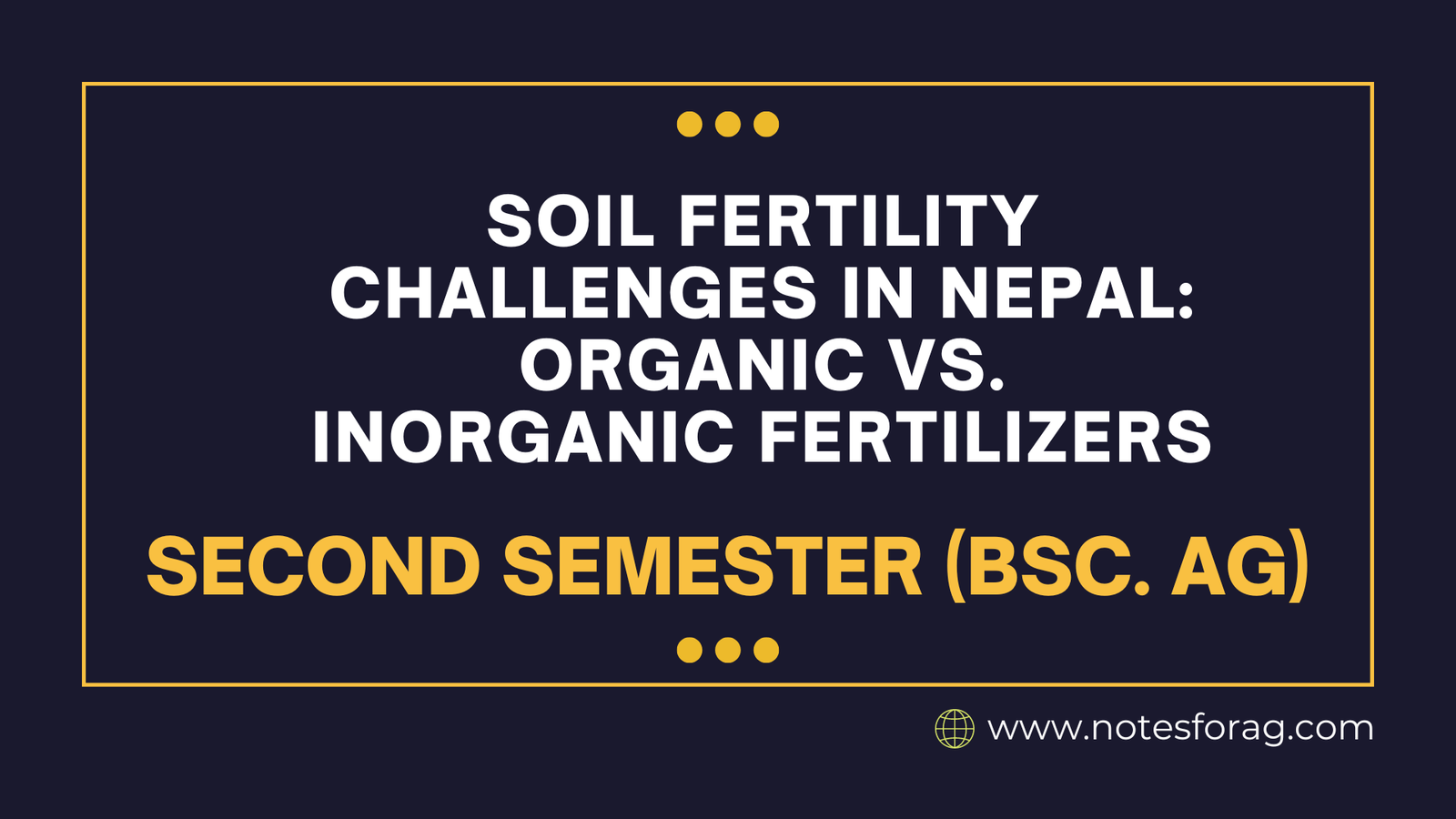Soil fertility challenges in Nepal pose a major obstacle to sustainable agriculture, significantly impacting livelihoods and food security. The argument over organic vs inorganic fertilizers highlights the challenge of striking a balance between immediate yield and long-term soil health. Chemical fertilizers may increase yields at first, but over time they also contribute to soil degradation. Organic farming techniques, on the other hand, naturally nourish the soil and provide a more sustainable solution. Nevertheless, obstacles like restricted availability of organic inputs and false beliefs about reduced yields prevent organic practices from being widely used. In order to achieve soil fertility in Nepal, a comprehensive strategy that takes into account the social, economic, and environmental effects of fertilizer choices is needed.
Table of Contents
Introduction to Soil Fertility in Nepal
Nepal, a country characterized by its diverse landscapes and rich cultural legacy, is largely dependent on agriculture for both food security and economic stability. A vital component of agricultural productivity, soil fertility affects crop yields and the general well-being of the farming ecosystem. Since agriculture employs the majority of the people in Nepal, soil fertility is a significant national issue.
Nepal’s traditional agricultural methods are influenced by centuries of indigenous cultural knowledge. Historically, these practices—which include crop rotation, mixed cropping, and applying organic manure—have helped to preserve soil fertility. But as a result of growing population pressure and the introduction of modern agricultural techniques, farming practices have undergone significant changes.
The delicate balance between sustaining soil fertility and satisfying the needs of a growing population has grown over time. Both organic and inorganic fertilizers are being used because conventional methods are frequently insufficient to meet the high productivity needs. In order to address the soil fertility challenges that Nepalese farmers face, fertilizers play a crucial role.
Soil Fertility Challenges in Nepal
Nepal faces a multitude of soil fertility challenges, which significantly impacts agricultural productivity and, consequently, the livelihoods of its people. Let’s examine some of the soil fertility challenges in Nepal:

1. Soil Degradation:
In Nepal, soil degradation is a serious problem because of a number of causes, including erosion, deforestation, and unsuitable farming methods. Degradation causes soil fertility to decrease, which impacts crop yields and ultimately the country’s food security.
2. Chemical Fertilizer Dependency:
Over time, Nepal, like many other developing nations, has witnessed an increase in the use of chemical or inorganic fertilizers. Although these fertilizers may increase crop yields at first, over time they tend to upset the natural balance of the soil, making it less able to retain water and nutrients.
3. Organic Farming Practices:
In contrast, organic farming places more emphasis on improving soil fertility through the use of natural inputs like compost, manure, and crop leftovers. By protecting biodiversity and soil health while reducing its negative effects on the environment, it supports sustainable agriculture.
4. Challenges of Organic Farming:
In Nepal, organic farming has a number of difficulties despite its advantages. The widespread adoption of organic practices is hampered by limited access to organic inputs, a lack of awareness among farmers, and the belief that organic fertilizers yield lower yields than chemical ones.
5. Research and Innovation:
Research institutes and non-governmental organizations in Nepal are also carrying out studies to create novel approaches for enhancing soil fertility with organic methods. This covers techniques that can naturally replenish soil nutrients, such as agroforestry, green manuring, and vermicomposting.
6. Government Initiatives:
The Nepalese government has implemented policies, provided subsidies, and conducted awareness campaigns to encourage organic farming. The National Organic Agriculture Policy is one initiative that aims to assist farmers in switching to organic practices and lessen their reliance on chemical inputs.
Organic Fertilizers: Benefits and Limitations
Organic fertilizers have drawn interest in Nepal because of their many advantages for sustainable agriculture and healthy soil. Compost, manure, and green manure are examples of organic fertilizers that are essential for improving soil structure. These fertilizers increase soil aeration, water retention, and root penetration by incorporating organic matter into the soil. In the end, this results in crops that are healthier and more resilient.

Increasing soil microbial activity is one of the main advantages of using organic fertilizers. The cycling of nutrients and the conversion of organic matter into forms that plants can absorb depend on the presence of microorganisms. Increased microbial activity promotes a healthy soil ecosystem, which enhances soil productivity and fertility over the long run.
The gradual release of nutrients is a noteworthy benefit of utilizing organic fertilizers. In contrast to inorganic fertilizers, which may cause nutrient leaching and environmental damage, organic fertilizers release nutrients gradually. By adjusting to the slow release schedule of plants, this product lowers the possibility of nutrient imbalances and encourages the growth of crops in a sustainable manner.
But there are drawbacks to using organic fertilizers. Because of this variability in nutrient content, precise nutrient management is difficult to accomplish. Transport and storage costs are increased because they frequently need bigger amounts to produce the same nutrient levels as chemical fertilizers. In addition, improper processing of organic fertilizers may result in the introduction of pathogens or weed seeds into the soil.
Inorganic Fertilizers: Benefits and Limitations
Chemical fertilizers, commonly referred to as inorganic fertilizers, have various advantages in agricultural production. They give plants easily accessible nutrients, which encourages quick growth and large yields. Since inorganic fertilizers are frequently very concentrated, precise nutrient management and specialized fertilization schedules based on crop requirements are made possible. Their homogeneous makeup guarantees a steady supply of nutrients, lowering the possibility of nutrient deficits and enhancing crop productivity. Furthermore, inorganic fertilizers are usually simple to use and easily soluble in water, which helps plants absorb nutrients effectively.

But there are drawbacks to inorganic fertilizers as well. Their dependence on artificial chemicals has the potential to deteriorate soil over time and decrease microbial activity, which will lower soil fertility and health. Consistent application of inorganic fertilizers can lead to runoff and excess nutrient leaching, nutrient imbalances, and soil acidification. Environmental concerns are exacerbated by the fact that their application and production increase energy consumption and greenhouse gas emissions. Sustainable agricultural practices frequently support a balanced approach that incorporates organic fertilizers and other soil management techniques to minimize their negative effects and enhance long-term soil health and ecosystem resilience, even though inorganic fertilizers can increase yields in the short term.
In Conclusion, to achieve sustainable soil fertility management in Nepal, integrating both inorganic and organic fertilizers could be a viable strategy. Combining the immediate nutrient supply from inorganic sources with the long-term soil health benefits of organic materials can create a balanced approach that supports both high yields and soil sustainability.
Frequently Asked Question(FAQ)
What are the main soil fertility challenges faced in Nepal?
In Nepal, issues like nutrient depletion, soil erosion, and degradation are common and have an effect on food security and agricultural productivity.
What is the difference between organic and inorganic fertilizers?
While inorganic fertilizers are chemical compounds that are artificially manufactured and contain specific nutrients, organic fertilizers are derived from natural sources like compost, manure, and plant residues.
Related Articles

